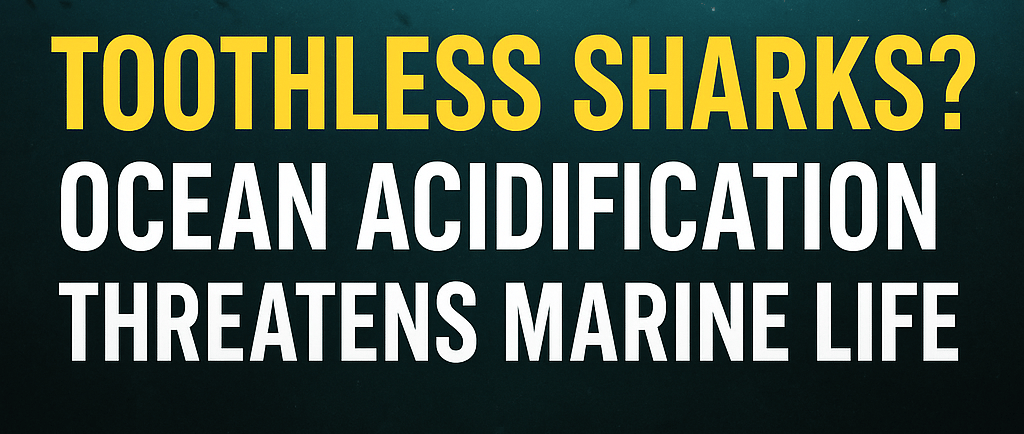Toothless Sharks: How Ocean Acidification Threatens Shark Teeth & Marine Ecosystems
Discover how rising ocean acidification is eroding shark teeth, affecting their hunting ability, and threatening marine ecosystem stability. Learn what this means for apex predators and the oceans’ future.
INTERNATIONALHEALTH
8/27/20252 min read


Toothless Sharks? Ocean Acidification Threatens Predator’s Key Survival Tool
Sharks could face feeding challenges as ocean chemistry changes, potentially disrupting marine ecosystems
Sharks losing their teeth may seem like a fantasy for swimmers, but new research indicates it could become a reality due to rapidly acidifying oceans. Scientists warn that the apex predators’ crucial hunting tool—their teeth—could be weakened, affecting their ability to feed and maintain healthy populations.
Shark jaws are equipped with multiple rows of teeth that continuously replace worn or lost ones. However, studies now show that the increasing acidity of ocean waters may erode these teeth faster than they can be replaced. This dental damage could compromise sharks’ ability to hunt efficiently, with broader consequences for marine ecosystems, according to the study.
Understanding Ocean Acidification
Ocean acidification occurs when oceans absorb excessive carbon dioxide (CO2) from the atmosphere, causing a drop in pH levels. Projections indicate that by 2300, ocean acidity could rise dramatically, lowering the pH from today’s average of 8.1 to around 7.3. Scientists warn this shift will have significant impacts on marine life, particularly species with mineralized structures such as teeth and shells.
To investigate, researchers examined 60 naturally shed teeth from blacktip reef sharks, collected from a German aquarium. The teeth were placed in two controlled seawater tanks: one reflecting the current ocean pH of 8.1 and another simulating future acidic conditions at pH 7.3.
Significant Tooth Damage Observed
After eight weeks, teeth exposed to the more acidic environment exhibited roughly twice the damage compared to those in normal conditions. Lead researcher Maximilian Baum from Heinrich Heine University noted “increased root corrosion and altered serration,” which could reduce the teeth’s effectiveness in capturing prey.
Dental degradation adds to other challenges sharks face, including declining food sources caused by overfishing. Scientists emphasize that reducing human CO2 emissions is essential to slow ocean acidification and protect marine predators.
Previous studies have also highlighted that acidification can damage denticles, the tooth-like scales covering sharks’ skin. Even minor pH shifts could particularly impact shark species with fewer teeth or slower replacement rates, Baum added.
Could Sharks Adapt?
While the findings are concerning, there is some optimism. Sharks may respond to tooth damage by increasing the rate of tooth replacement or enhancing repair mechanisms. Lisa Whitenack, a shark tooth expert at Pennsylvania’s Allegheny College, noted that even corroded teeth might still function for hunting. Future studies will determine whether acidification-related damage affects tooth performance in real-world feeding scenarios.
Broader Implications for Marine Life
Sharks are just one example of how acidification threatens marine organisms with mineralized structures. Coral reefs, shellfish, and mollusks are already known to suffer under lower pH conditions. This study highlights that the problem extends to top predators, potentially reshaping entire ocean food webs.
Protecting sharks and other marine life requires immediate action to reduce carbon emissions and combat climate change. Safeguarding these apex predators ensures the stability of marine ecosystems for generations to come.
Explore
Your lens into Pakistan's vibrant stories.
Connect
Discover
+92-300-0440097
© 2025. All rights reserved.
